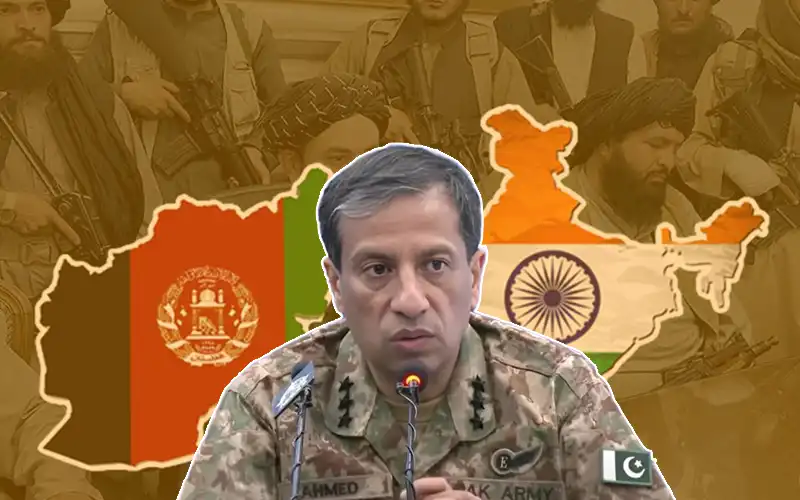“The major cause of terrorism is Afghanistan serving as a base of operations for Indian proxies against Pakistan,” said Director General (DG) Inter-Services Public Relations (DG ISPR) Lieutenant General Ahmed Sharif Chaudhry in a press conference.
During an important press conference in Peshawar, DG ISPR LTG Chaudhry has outlined the five key reasons behind the recent rise in terrorism across Pakistan.
Afghanistan – Base of Operations of Indian proxies
According to the DG ISPR, the first major cause of terrorism is Afghanistan, serving as a base of operations for Indian proxies against Pakistan.
He accused India of providing financial, logistical, and intelligence support to militant groups operating from Afghan soil.
He highlighted that this terror-crime nexus is the backbone of ongoing militant activities, adding that Pakistan’s armed forces and intelligence agencies are working tirelessly to ensure peace and stability in Khyber Pakhtunkhwa (KP) and beyond.
He alleged that nearly 30 suicide bombers involved in attacks during the past two years were Afghan nationals, proving how India is exploiting Afghanistan to plan and sponsor terrorism in Pakistan.
Politics on Terrorism
The second reason, he said, was the politicization of terrorism, which has hindered national unity and effective countermeasures.
General Chaudhry lamented that although all political parties had earlier agreed to eradicate smuggling and terror networks, resistance arises whenever law enforcement agencies act against such elements.
He highlighted governance gaps and poor policy implementation, which have forced security institutions to step in and sacrifice their personnel for the protection of citizens.
Referring to national decisions, he recalled that the repatriation of Afghan refugees was unanimously approved in 2014 and reaffirmed in 2021, yet remains unfulfilled.
Non implementation of revised National Action Plan (NAP)
The third reason includes the incomplete implementation of the National Action Plan (NAP), the politicization of terrorism-related issues that confuses within the nation, and external factors—particularly accusing India of instigating Afghanistan against Pakistan, Sharif said.
He also pointed to the presence of safe havens and the influx of modern weaponry into Afghanistan as contributing elements.
READ: Indian aggression will be met with strong, decisive response: Corps Commander
Reflecting on the National Action Plan, he emphasized that the first of its 14 points was the elimination of terrorist groups. He criticized the fact that the plan has not been fully executed and that successive governments have altered its framework without proper implementation. Quoting historical conflicts, he remarked, “If every issue could be resolved through dialogue, there would never be war,” underscoring that sometimes, decisive action becomes necessary.
U.S advanced weapons in the hand of terrorists.
General Ahmed Sharif pointed out that the U.S. left behind weapons worth $7.2 billion in Afghanistan, and many of these have now been seized by militant groups.
He also highlighted that in just the past three months, 284 counter-terrorism operations have been carried out, with 70% of them occurring in Khyber Pakhtunkhwa, underscoring the escalating threat in the region.
Political patronage of terror-crime nexus.
Lieutenant General Ahmed Sharif Chaudhry, the Director-General of ISPR, stated that a political-criminal nexus is fueling terrorism in Khyber Pakhtunkhwa (KP).
He warned that no one would be allowed to compromise the rights or future of KP’s people for personal interests.
He pointed out that while such political alliances supporting terrorism have not been as effective in Sindh and Punjab, KP continues to be a primary target for these coalitions.
The DG ISPR made it clear that the state, the military, and law enforcement agencies will not tolerate any form of collusion with terrorist groups, and security forces are committed to making it difficult for terrorists and their supporters to operate.
He also emphasized that anyone facilitating terrorism – regardless of their status – will face strict action, reaffirming the country’s zero-tolerance stance toward those aiding militant organizations.
Reviewing the operational progress, General Chaudhry revealed that during 2024, some 435 intelligence-based operations were conducted in KP, while the figure rose to 10,115 in 2025 so far.
During these operations, 917 terrorists were eliminated, and 577 personnel were martyred in 2024, with 516 more losing their lives in 2025.
He concluded by paying tribute to the martyrs of KP, stating that the brave sons of the soil have written a history of valor with their blood. “The Pakistan Army and the people of KP stand united in the fight against terrorism,” he said.











